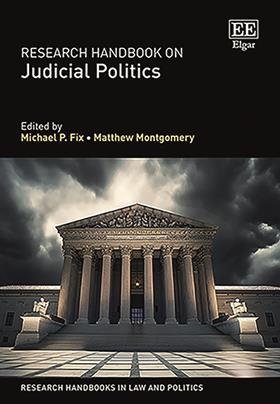Research Handbook on Judicial Politics
Edited by Michael P. Fix and Matthew D Montgomery
£225, Edward Elgar
★★★✩✩
The prospect of a book on judicial politics initially left me cold. The politics – or perceived politics – of the judiciary is a perennial fascination for a certain type of newspaper. If the media is to be believed, there are three types of judge, each of whom is ‘out of touch’ with the common person. These are small-‘c’ conservatives who give stiff sentences for minor offences; ‘lefty lawyers’ who refuse to deport felons because of the Human Rights Act; and the liberal-elite – in extreme circumstances, the ‘Enemies of the People’ of a notorious headline.
Mercifully, tabloid obsessions and Robespierrean paranoia are absent from this work, which deals with the politics surrounding the judiciary rather than judges’ politics.

Primarily concerned with the US, this collection of essays considers topics such as decision-making, appointment and public opinion. The American angle is particularly interesting regarding relations between the courts and the other branches of government, and the ways – such as powers of appointment, public statements, and outright manipulation – in which Congress and the executive seek to influence the Supreme Court, while the court in turn tries to exert its own influence. The Machiavellian manoeuvrings described in some of the papers provide, frankly, the best argument for avoiding a US-style politically appointed judiciary, where the Supreme Court’s composition is often seen as a key part of a president’s legacy.
Where the work is most insightful is on the issue of institutional legitimacy. In an American context, the Supreme Court aims at legitimacy in public opinion. This seems not to be a particular issue with the courts in the UK – ‘Enemies of the People’ jibes apart – and the concept is not one I had appreciated was significant. In essence, it is a measure of not only whether the public agrees with the court’s decisions, but whether they accept the decisions and institution as having validity.
This is an interesting work - principally for its insight into the workings of the much more politicised US judiciary – but not one I can recommend especially highly. Some essays are a little dry, and it is more a book to dip into than read cover to cover. Ideal for specialists, particularly those within reasonable distance of a good law library.
James E Hurford is a solicitor at the Government Legal Department, London































No comments yet